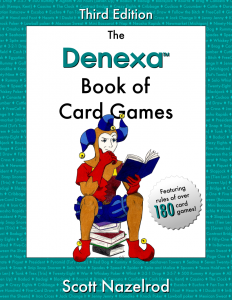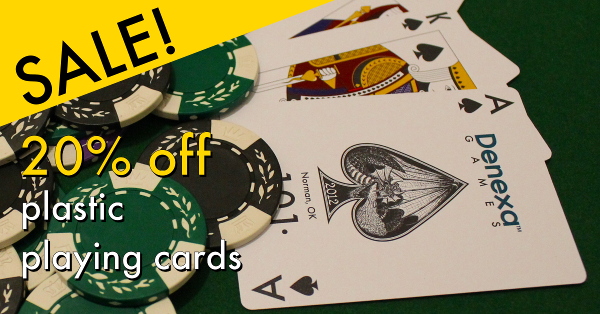Nap
Nap, originally known as Napoleon, which Nap is an abbreviation of, is essentially a stripped-down and simplified version of Euchre for three to seven players. Despite its heavy use of the names of early nineteenth-century military personalities, Nap didn’t appear in written records until the latter half of the century.
Object of Nap
The object of Nap is to accurately predict the number of tricks you will take, thus scoring points by fulfilling bids.
Setup
Nap uses a special deck which varies based on the number of players. For three players, the deck consists of aces through nines in the four standard suits. For four players, eights are added, sevens are added for five players, and so on. Optionally, a joker may be added, which functions as the highest trump, and remains such in hands that would otherwise have no trump. You can create the appropriate deck by starting from a deck of Denexa 100% Plastic Playing Cards and removing the inapplicable cards.
Scoring is generally accomplished by the use of poker chips. Distribute an equal number of chips to each player. If desired, Nap can become a betting game, by all players agreeing to the value of one credit (which can be represented by one chip per credit, or simply transacted in cash). In this post, we’ll use the term credit to refer to this value, whether it has a cash value attached to it or is just a point.
Shuffle and deal five cards to each player, dealing one batch of three, followed by a batch of two. The deck stub is set aside and takes no further part in game play.
Game play
Before game play begins, a round of bidding takes place, beginning with the player to the dealer’s left. Bids are as follows, from lowest to highest:
- Two (two credits): The player will win two tricks.
- Three (three credits): The player will win three tricks.
- Mis (three credits): The player will lose all five tricks.
- Four (four credits): The player will win four tricks.
- Nap (ten credits): The player will win all five tricks.
- Wellington (twenty credits): The player will win all five tricks.
- Blücher (forty credits): The player will win all five tricks.
A bid may only be overcalled by a higher bid. Wellington may only be bid if Nap has been bid previously, and Blücher may only be bid if Wellington has been bid previously. Note that Wellington and Blücher are functionally identical to Nap, but simply carry higher stakes.
The player that won the bidding leads to the first trick. The suit of whichever card is led to this trick becomes the trump suit, unless the winning bid was mis, in which case the hand is played with no trump suit. Each player to the left then plays a card. If able to follow suit, a player must do so. Otherwise, they are free to play any card, including a trump. The trick is won by the highest card of the suit led, unless a trump is present, in which case the highest trump wins the trick.
Collected tricks are not added to the hand, but rather kept in a discard pile in front of the player that won it. Since it is important to keep track of the number of tricks captured, each trick should be placed onto the pile at right angles, so that the tricks can be easily separated after the hand. The player that won the trick leads to the next one.
When all five tricks have been played, the high bidder examines their discard pile and it is determined whether or not the contract is fulfilled. If it is, all players pay them the appropriate number of credits, as shown above. If not, they must pay every other player the amount of credits dictated by the bid.
Deal passes to the left. It is customary to merely cut the deck stub and deal with it, shuffling only when the deck is depleted or when a bid of Nap or above is successfully completed.


